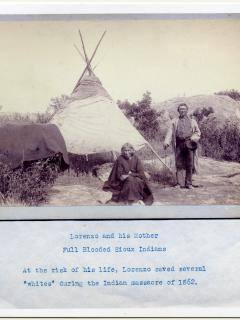God created me as an Indian; therefore it must be all right to be Indian. And if people don’t accept that and can’t accept the fact that I’m Indian, or me as an Indian, then they’ve set their standards higher than God, and I don’t have to listen to them; I can disregard them. And so it took me 32 years just to come to that point, but that’s where everything started to change, and that’s where life itself began to change for a whole new life. And it’s based not anymore on what I am, but it’s based on who I am. And who you are is something nobody can take away from you. What you are can die out, fade out, become outdated, and you can change your views and all that. But who you are stays that way. It goes with you through this life and into the next one.
Who you are is something nobody can take away from you
Who you are is something nobody can take away from you
Dr. Lawrences reflects on his life and identity, as well as Native American enrollment in the military.
Reflect on Dr. Lawrence's words: “Why is it that we as Indian people, during times of war, we all volunteer? Of any other ethnic group we have the highest volunteerism rate during wartime, and we’ve got the least to gain from war.”
Audio Chapters
Life is to live and try to prosper, try to be happy, try to do some good for other people and make other people’s lives a little bit better, in a sense like they say leave the world a better place than you found it. And all those things, that’s one part of life. The other part of life is where you dwell on what the ending of life is going to be like, that something has to – everything is in vain. Everything that I had hoped to accomplish is gone; there’s nothing left. The most I can hope is to get out of this life with some kind of honor. And the way to do that is by dying for an honorable cause; die for your people, or whatever it is, but it’s a point of honor. Indian people still do the same thing. I don’t know for sure if that’s why I went in the service, but I’ve heard other people talk about it. I’ve talked to older elders who were in World War Two and asked them about that. And I asked one guy, “Why is it that we as Indian people, during times of war, we all volunteer? Of any other ethnic group we have the highest volunteerism rate during wartime, and we’ve got the least to gain from war.” And he said part of it has to do with the warrior instinct. That when a war breaks out or a war happens, you see it as your responsibility, that I need to go, I need to go there so he doesn’t have to go, or he doesn’t have to go, or so that they don’t come over here –whatever. That’s what I need to do because I’m a warrior.And that’s one of the reasons why a lot of them join. And the other thing is that honor that comes from being a warrior. You can live a totally miserable, bad life all your years, but if you can die honorably, somehow that makes up for everything.
Permissions beyond the scope of this license may be available at Copyright and Use Information.
Oral History- Interview | Narrator Elden Lawrence Interviewer Deborah Locke made in New Ulm, MN | Tuesday, April 12, 2011
Read or listen to entire Oral History

Other Stories by Narrator
- The depth of the water is 3.8 feet
- It would serve as a memorial to the people that were there
- Who you are is something nobody can take away from you
- The ideal American doesn’t really exist; he’s a myth
- "We’re going to drive you all the way to the Rocky Mountains"
- “You guys can’t be in here; I own all the air in here”
- You don’t give up.
- Family roles were very structured and followed very closely
- Milford Monument
- Two ways of life were clashing
- If I don’t break down some barriers, if I don’t tread some new paths...
- Common ground
- They got some recompense, I guess
- Lorenzo Lawrence (Towanetaton)
- “I’ll die with you. Because I’m not a coward.”
